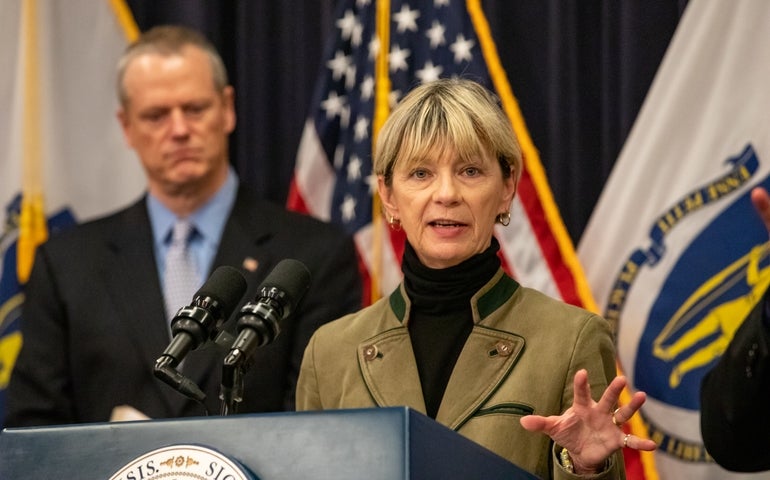State officials are committed to keeping the health care system open during a second surge of the coronavirus pandemic, the head of the Baker administration’s COVID-19 command center said Friday.
Health and Human Services Secretary Marylou Sudders, speaking during a webinar hosted by the Massachusetts Association of Health Plans, said the state would work with hospitals, providers and insurers to “engage in more nuanced planning in order to maintain access throughout the fall and winter.”
As COVID-19 cases first began to climb in Massachusetts, a March 15 order from Public Health Commissioner Monica Bharel mandated that Massachusetts hospitals cancel non-essential elective procedures. Non-emergency procedures started to resume in May, as the state embarked on the earliest stages of its economic and social reopening after the initial surge peaked in mid-April.
“We’ve learned a lot from the spring,” Sudders said. “It’s easy to shut things down. It’s hard to reopen things and have people feel confident that it’s safe, that they can go for health care services, non-COVID treatments and the like, and we have made a commitment to work with the hospital and health care industry on how to keep services and treatments, procedures open while we manage through COVID.”
That effort, Sudders said, involves “a lot of data” as hospital systems look at how to prioritize elective treatments in the event that COVID-19 hospitalizations and intensive care unit use spike. Unlike in the spring, she said, almost half of the people testing positive now are under age 40, and there has been less of a demand for ICU beds.
“We also saw some of the consequences of shutting things down in terms of people delaying treatment, and then when they were hospitalized it was for very, very serious conditions, so we’re trying to find the balance here,” she said.
As of Thursday, there were 498 patients with confirmed COVID-19 in the hospital, including 115 in the ICU, according to the Department of Public Health. For the two-week period from Oct. 18-31, the average age of hospitalized COVID-19 patients was 67.
Over the course of the past week, the DPH has reported 8,957 new cases of COVID-19, bringing the state’s total confirmed caseload to 160,698. The seven-day average of new confirmed cases, at 918 on Nov. 4, is up 485 percent from its lowest-recorded value of 157.
“While the pandemic is far from over, and we are in our second surge in Massachusetts, I really do have confidence that our health care community and our communities as a whole will find the path forward,” Sudders said. “And while there is no playbook to a pandemic of this kind — don’t we all wish there was — and we all can’t wait for there to be a safe, effective and widely available vaccine, I have confidence that we will get through this challenging time together.”
The secretary said she and DPH officials met Thursday with representatives of the vaccine development project known as Operation Warp Speed and heard “a couple of things that were encouraging.”
One, she said, is that governors and states will be allowed to determine which populations should have priority in the distribution of an eventual vaccine.
“That has not always been clear from the federal government, like who would decide that, authorities in a state,” she said. “As we know, the state’s demographics in Massachusetts are very different than in other states.”
Sudders said Massachusetts officials also asked how the federal government plans to allocate vaccines to states, and said that Massachusetts favors “a straight per capita allocation of vaccines.”

